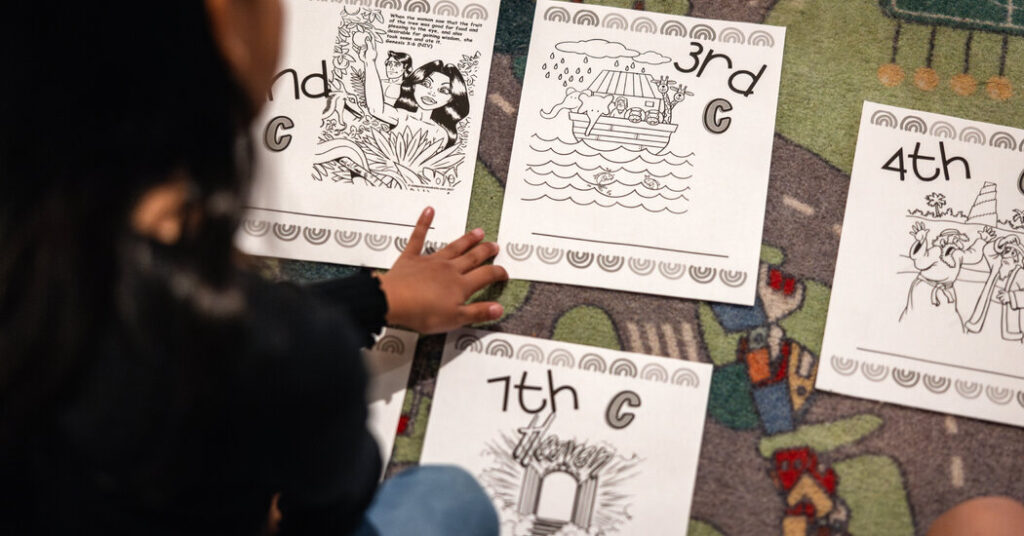Advocates for private-school choice celebrated this week as a federal schools voucher bill moved closer to becoming law, a major milestone that eluded their movement during President Trump’s first term.
The House Republican budget proposal that advanced on Monday would devote $5 billion to federal vouchers for private-school tuition, home-schooling materials and for-profit virtual learning.
The program in the budget bill could bring vouchers to all 50 states for the first time, including Democratic-leaning ones that have long rejected the idea.
Supporters hailed the proposal as “historic” and a “huge win,” but some cautioned that there was still much legislative haggling ahead.
“Ultimately, every child, especially from lower-income families, should have access to the school of their choice, and this legislation is the only way to make that happen,” said Tommy Shultz, chief executive of the American Federation for Children, a private-school choice advocacy group.
Opponents of the proposal were stunned at its sweeping implications. While it is in line with President Trump’s agenda, it had been considered somewhat of a long shot to make it out of the House Ways and Means Committee, because of its cost.
The program is structured as a $5 billion tax credit, allowing donors to reduce their tax bill by $1 for every $1 they give to nonprofits that grant scholarships — up to 10 percent of the donor’s income.
The option to donate is expected to be popular with wealthy taxpayers.
The resulting scholarships could be worth $5,000 per child, reaching one million students. Any family who earns less than 300 percent of their area’s median income — which equals over $300,000 in some parts of the country — could use the funds, meaning a vast majority of families would be eligible.
The proposal could pass through the budget reconciliation process, and could become law with only 51 votes in a Senate where Republicans hold 53 seats.
In the wake of the Covid-19 pandemic, many Republican-led states passed new private-school choice laws, overcoming decades of resistance from teachers’ unions, Democrats and rural conservatives. Opponents have long argued that vouchers hurt traditional public schools, by decreasing enrollment and funding levels. And they have pointed out that lower-income neighborhoods and rural areas often have few private schools, making it difficult for many families to use vouchers.
“We are against giving people tax breaks to defund public schools,” said Randi Weingarten, president of the American Federation of Teachers, the nation’s second-largest education union.
She pointed out that while Mr. Trump and congressional Republicans have said they want to invest in work force education, artificial intelligence education and other priorities for student learning, they have consistently proposed cutting funding to public schools, which educate nearly 90 percent of American students.
“They don’t believe in public schooling,” she said. “What you’re seeing here is the fragmentation of American education.”
A boom in new private-education options, like virtual learning and microschools, has already changed the landscape — as has an influx of campaign spending from conservative donors, like the financier Jeff Yass, intended to build support for private-school choice.
Last month, Texas became the last major Republican-led state to pass such legislation. Advocates quickly shifted their focus to Congress and the opportunity to push a federal voucher bill.
Senator Bill Cassidy, Republican of Louisiana, is the sponsor of a Senate bill similar to the House proposal, and celebrated its inclusion in the budget package.
“Expanding President Trump’s tax cuts is about preserving the American dream,” he said in a written statement. “Giving parents the ability to choose the best education for their child makes the dream possible.”
But the proposal will still have to overcome opposition, on both the left and the right.
Advocates for public schools have said that the new generation of vouchers and education savings accounts, which are often available to relatively affluent families, are a subsidy to parents who can already afford private education.
In Florida, which has more children using vouchers than any other state in the nation, some public-school districts have experienced enrollment declines and are considering shutting down schools or cutting teaching positions.
Even some conservative parental-rights activists oppose the creation of a federal program, which they worry could create a regulatory pathway that could eventually be used to impose government requirements on home-schooling parents or private schools — for example, by requiring standardized testing, which is not mentioned in the current proposal.
“The federal government should extricate itself from K-12 education to the fullest extent possible,” said Christopher Rufo, a leading crusader against diversity programs in schools, and a supporter of school choice. “It’s best left to the states.”



